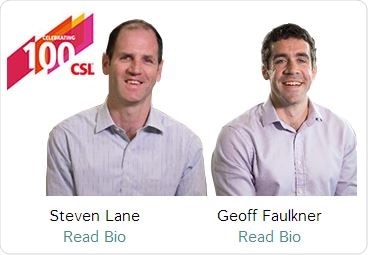Oct 13 2016
Two Australian scientists have each been awarded an AUD$1.25 million, five-year, CSL Centenary Fellowship to further research that aims to help patients beat leukaemia and examine the origins of memory to better understand Alzheimer’s disease.

Prof Geoff Faulkner and Assoc Prof Steven Lane are the inaugural Fellows in a $25 million program established by CSL in its Centenary year to support Australia’s best and brightest biomedical researchers—fostering excellence in medical research by supporting mid-career scientists to pursue world-class research at an Australian institution.
Professor Geoff Faulkner from the University of Queensland thinks long-term memory might be stored in our brain’s DNA and he’ll test his theory in brains affected by Alzheimer’s.
It’s a bold idea. Geoff has already shown that the DNA in our brains is different to that in the rest of our bodies, and that it changes as we learn. He’s proposing that these changes are associated with how we store our long-term memories. With the CSL Centenary Fellowship he’ll test the idea on brain tissue donated by Alzheimer’s patients to determine if DNA is involved in memory formation, and what the implications of this might be for people living with Alzheimer’s.
His research is moving us closer to an understanding of conditions like Alzheimer’s and hopefully towards a cure for this chronic and devastating disease.
Associate Professor Steven Lane from the QIMR Berghofer Medical Research Institute wants to tailor leukaemia treatments to reduce relapse rates in older patients.
Today, 85 per cent of children with leukaemia can be cured, but the outlook for patients over 60 is bleak, with only 10 per cent surviving beyond one year as their cancer adapts to weather the storm of standard chemotherapy treatments. Steven wants to change that outlook.
He has developed a method to rapidly profile the genetics of leukaemia types and model them in the lab, allowing him to map the effectiveness of chemotherapy treatments against the genomes of individual cancers.
The CSL Centenary Fellowship will support his efforts at tailoring treatments to individuals. Specifically, he’ll use the Fellowship to identify new drug pathways and explore repurposing existing drugs to target resistant leukaemia types.
“Australian research punches above its weight on the world stage with an excellent track record in new discoveries to potentially address the world’s unmet medical needs,” said CSL CEO & Managing Director Paul Perreault.
“At CSL, we are driven by our promise to save lives and protect the health of people around the world. We’re extremely proud to support research that holds the potential to save and change many lives. Our Centenary Fellowships honour CSL’s long legacy of contributing to innovative medicines, particularly for patients suffering serious diseases.”
CSL Chief Scientific Officer Andrew Cuthbertson says Geoff and Steven are the embodiment of what these Fellowships are about.
“Innovation is one of the core values that guide CSL’s significant investment into medical science, so it is fitting that the Centenary Fellowships seek to foster the best scientists in Australia who will shape the next century of critical breakthroughs.”
“Growing skills and expertise through well-funded, long-term support is essential in order to help the Australian research community continue to thrive,” Andrew says.